
The economy of the Dominican Republic is the eighth largest in Latin America, and is the largest in the Caribbean and Central American region. The Dominican Republic is an upper-middle income developing country primarily dependent on mining, agriculture, trade, and services. The country is the site of the single largest gold mine in Latin America, the Pueblo Viejo mine. Although the service sector has recently overtaken agriculture as the leading employer of Dominicans, agriculture remains the most important sector in terms of domestic consumption and is in second place in terms of export earnings. Tourism accounts for more than $1 billion in annual earnings. free-trade zone earnings and tourism are the fastest-growing export sectors. According to a 1999 International Monetary Fund report, remittances from Dominican Americans, are estimated to be about $1.5 billion per year. Most of these funds are used to cover basic household needs such as shelter, food, clothing, health care and education. Secondarily, remittances have financed small businesses and other productive activities.

The economy of Kazakhstan is the largest in Central Asia in both absolute and per capita terms, but the currency saw a sharp depreciation between 2013 and 2016. It possesses oil reserves as well as minerals and metals. It also has considerable agricultural potential with its vast steppe lands accommodating both livestock and grain production. The mountains in the south are important for apples and walnuts; both species grow wild there. Kazakhstan's industrial sector rests on the extraction and processing of these natural resources.

The United Nations Industrial Development Organization (UNIDO) is a specialized agency of the United Nations that assists countries in economic and industrial development. It is headquartered at the UN Office in Vienna, Austria, with a permanent presence in over 60 countries. As of April 2019, UNIDO comprises 170 member states, which together set the organization's policies, programs, and principles through the biannual General Conference.
Small and medium-sized enterprises (SMEs) or small and medium-sized businesses (SMBs) are businesses whose personnel numbers fall below certain limits. The abbreviation "SME" is used by international organizations such as the World Bank, the European Union, the United Nations and the World Trade Organization (WTO).
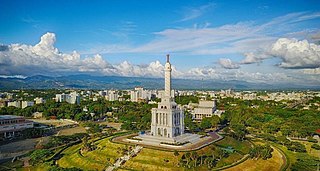
Santiago is a province which currently comprises one of the 32 provinces of the Dominican Republic. It is divided into 10 municipalities and its capital city is Santiago de los Caballeros. Located in north-central Dominican Republic, in the Cibao region, it is bordered by the provinces of Valverde to the north-west, Puerto Plata to the north, Espaillat and La Vega to the east, San Juan to the south and Santiago Rodríguez to the west.
Cluster development is the economic development of business clusters. The cluster concept has rapidly attracted attention from governments, consultants, and academics since it was first proposed in 1990 by Michael Porter.
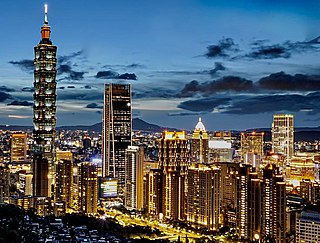
The Taiwan Miracle or Taiwan Economic Miracle refers to the rapid industrialization and economic growth of Taiwan during the latter half of the twentieth century. As it developed alongside Singapore, South Korea and Hong Kong, Taiwan became known as one of the "Four Asian Tigers".

In economics, competition is a scenario where different economic firms are in contention to obtain goods that are limited by varying the elements of the marketing mix: price, product, promotion and place. In classical economic thought, competition causes commercial firms to develop new products, services and technologies, which would give consumers greater selection and better products. The greater the selection of a good is in the market, prices are typically lower for the products, compared to what the price would be if there was no competition (monopoly) or little competition (oligopoly). This is because there is now no rivalry between firms to obtain the product as there is enough for everyone. The level of competition that exists within the market is dependant on a variety of factors both on the firm/ seller side; the number of firms, barriers to entry, information availability, availability/ accessibility of resources. The number of buyers within the market also factors into competition with each buyer having a willingness to pay, influencing overall demand for the product in the market.
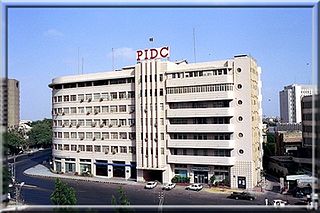
Pakistan Industrial Development Corporation (PIDC) is a state corporation of Pakistan working under Ministry of Industries and Production. It was established in 1952. PIDC was created to set up industries in such fields where large capital was required and was difficult for the private sector and to set up industries in such backward areas to creating employment opportunities.

The Standards, Productivity and Innovation Board ,(Abbreviation: SPRING Singapore) was a statutory board under the Ministry of Trade and Industry of Singapore. It worked as an agency for enterprise development, and helped enterprises to enhance the competitiveness in Singapore market. It was also the national standards and conformance body.

The America Creating Opportunities to Meaningfully Promote Excellence in Technology, Education, and Science Act of 2007 or America COMPETES Act was authored by Bart Gordon and signed by President George W. Bush; it became law on 9 August 2007. This was an Act, "To invest in innovation through research and development, and to improve the competitiveness of the United States."
Established in 1993, the Investment and Development Agency of Latvia, or LIAA for short, acts under the Ministry of Ministry of Economics of the Republic of Latvia. Since 2020, the Director of LIAA is Kaspars Rožkalns.
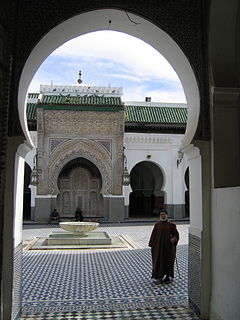
Science and technology in Morocco has significantly developed in recent years. The Moroccan government has been implementing reforms to encourage scientific research in the Kingdom. While research has yet to acquire the status of a national priority in Morocco, the country does have major assets that could transform its R&D sector into a key vehicle for development. The industry remains dominated by the public sector, with the universities employing 58% of researchers. Morocco's own evaluation of its national research system – carried out in 2003 – revealed that the country has a good supply of well trained high quality human resources and that some laboratories are of very high quality. However, the greatest gap at that point of time lied in the link between research and innovation. The educational qualifications of Moroccan researchers have increased significantly since the early 1990s. The University of Al-Karaouine is considered the oldest continuously operating academic degree-granting university in the world.
The United Kingdom, where the Industrial Revolution began in the late 18th century, has a long history of manufacturing, which contributed to Britain's early economic growth. During the second half of the 20th century, there was a steady decline in the importance of manufacturing and the economy of the United Kingdom shifted toward services. Manufacturing, however, remains important for overseas trade and accounted for 44% of goods exports in 2014. In June 2010, manufacturing in the United Kingdom accounted for 8.2% of the workforce and 12% of the country's national output. The East Midlands and West Midlands were the regions with the highest proportion of employees in manufacturing. London had the lowest at 2.8%.
Small and medium enterprises in Mexico, generally called PyMEs, are an important segment of the Mexican economy. They are classified in two types of small and medium enterprises: family businesses and non-family businesses.

The North East of England Process Industry Cluster (NEPIC) is an economic cluster created following the industrial cluster ideas and strategy of Michael Porter. This Process Industry Cluster has been created by the chemistry using industries based in North East England where more than 1,400 companies are based in the supply chain of the sector. The sector has over 35,000 direct employees and some 190,000 indirect employees in the northeast of England and together they represent over one third of the industrial economy of the region. Companies in the Cluster manufacture 50% of the UK's Petrochemicals and 35% of the UK's Pharmaceuticals and they significantly contribute towards making the region the only net exporting region of the UK. The region has over £13 billion of exports.

The Ministry of International Trade and Industry, abbreviated MITI, is a ministry of the Government of Malaysia that is responsible for international trade, industry, investment, productivity, small and medium enterprise, development finance institution, halal industry, automotive, steel, strategic trade. The ministry has its headquarters at the Menara Miti on Jalan Sultan Haji Ahmad Shah in Kuala Lumpur. It is one of the three ministries that has not moved to Putrajaya.
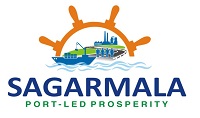
The Sagarmala Programme is an initiative by the government of India to enhance the performance of the country's logistics sector. The programme envisages unlocking the potential of waterways and the coastline to minimize infrastructural investments required to meet these targets.
The Thai-German Institute (TGI) is a not-for-profit entity under the Foundation for Industrial Development (FID), which itself falls under the Ministry of Industry (Thailand). The aim of the organization is to act as a training center for transferring advanced manufacturing technology to the Thai industry.

The National Food Institute (NFI) is a not-for-profit entity under the Foundation for Industrial Development (FID), which itself falls under the Ministry of Industry (Thailand).













